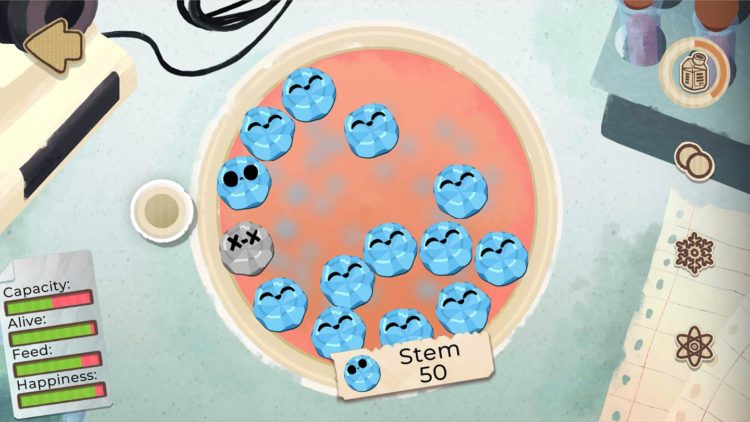
Credit: Pocket Sized Hands
The scientist inside your phone is having a stressful day. Trying to finish a research paper while keeping a batch of cells alive, the last thing they need is “something funky” in their petri dish.
As demigod of this pocket-based laboratory, what will you do? Feed the famished stem cells, or console an upset colleague? Order the latest lab tech, or book a flight to the big conference?
Now the boss is frantic, your cells are contaminated, and the rest of the lab have disappeared on holiday. Maybe it’s time to seek shelter in the tearoom…
A new phone game from the University of Cambridge puts players in the lab coat of a young stem cell research scientist as they navigate the tough route from undergraduate to the top tiers of modern science.
Dish Life, launched today and free to download on iPhone App Store, Android App Store and Steam (PC), has been developed by Cambridge sociologists and stem cell scientists from the University’s Stem Cell Institute. It aims to provide a flavour of the lives and labour behind biotechnological advances.
“The route to scientific discovery can feel like a mystery to many of us,” said Dr Karen Jent from the ReproSoc group in Cambridge’s Department of Sociology, who led the game’s development. “A lot of people only encounter the process of science through hyperbolic headlines or cinematic tales of the lone genius.”
“We want to use gaming to have a different kind of conversation about science,” said Jent. “Science involves teamwork and care as much as reason and logic. We aimed to create an interactive experience reflecting the nurturing of experiments and building of social relationships at the heart of good science.”
For her research fieldwork, Jent has been embedded in stem cell labs, where she observed not just the dynamic between scientists, but the curious connection researchers have with the cells they grow, which need near-constant care and attention – a bit like microscopic kids.
These relationships are central to the gameplay, which the team describe as “part Sims, part Tamagotchi” with a dose of strategy and dilemma. Players must balance competing demands: growing a range of ever-hungry cells while adding to their lab’s wellbeing and reputation – all as they negotiate the scientific career ladder through publication and promotion.
The game follows on from a short film produced in 2016 by stem cell scientist Dr Loriana Vitillo and Jent in collaboration with director Chloe Thomas. Also called Dish Life, it cast a group of children in a paddling pool as stem cells in a dish.
The film featured scientists discussing their oddly intimate rapport with cell cultures: the constant checking, feeding and coaxing – even talking aloud to them – for months on end to keep cells happy, in the hope they bloom into healthy colonies.
“It was an ordinary day in the lab, feeding cells, when it occurred to me that we often talk about what we discover but not how we discover, about our real lives,” said Vitillo, game and film co-producer, and Cambridge Stem Cell Institute alumni. “I wanted to tell a different story.”
“With stem cells set to change healthcare, we want to make biotechnology more accessible by showing how this science is really done.”
In the game, players zoom in to feed chirruping cells with “medium” – nutrient-dense liquid used in labs – then split up overfull petri dishes and convert cells into specific types, from blood to neurons. This helps build experience points, unlocking new abilities such as hiring researchers and buying equipment.
But the continual nurturing of cells, digital pet-style, must be reconciled with social life in the lab, where contentment of your scientist avatar and colleagues needs to be managed alongside “quests” that take in everything from drug spinouts to job interviews.
“The first thing a player does is to make their own scientist,” said co-producer and Cambridge sociologist Dr Lucy van de Wiel. “You can choose your body type, skin colour, hairstyle and whether you are male, female or transgender.
“Gender and ethnicity are at the heart of game. Players encounter some of the broader social challenges experienced by people in science, whether it’s gender pay gaps or trans rights issues,” she said.
“We hope the game offers new ideas and stories for imagining what a scientist looks like, and how the modern scientific life is lived.”
Dish Life is littered with dilemmas that occur while players are racking up research and cell cultures. From workplace issues such as bullying and maternity cover, through to societal dramas – e.g. media controversies and government committees – and ethical quandaries encompassing animal testing and CRISPR.
As players rise from student to PI and eventually professor, they acquire extra dishes and rooms, as well as broader perspectives. “Once you run a successful lab, the game opens up questions of medical ethics, environmental impact, the bioeconomy and equality in science,” said Jent. “Although those cells will always need feeding.”
###
Dish Life has been designed by Dundee-based games company Pocket Sized Hands, and funded by the Wellcome Trust and ESRC. As well as a general release, the Cambridge team will continue to test the game with groups of stem cell scientists and update gameplay accordingly.
Cambridge Enterprise, the commercialisation arm of the University, negotiated a licence with Pocket Sized Hands on behalf of the academic team. The licence reflects continuation of the collaborative nature of the relationship and secures a future for the game.
Media Contact
Fred Lewsey
[email protected]
44-122-376-5566





